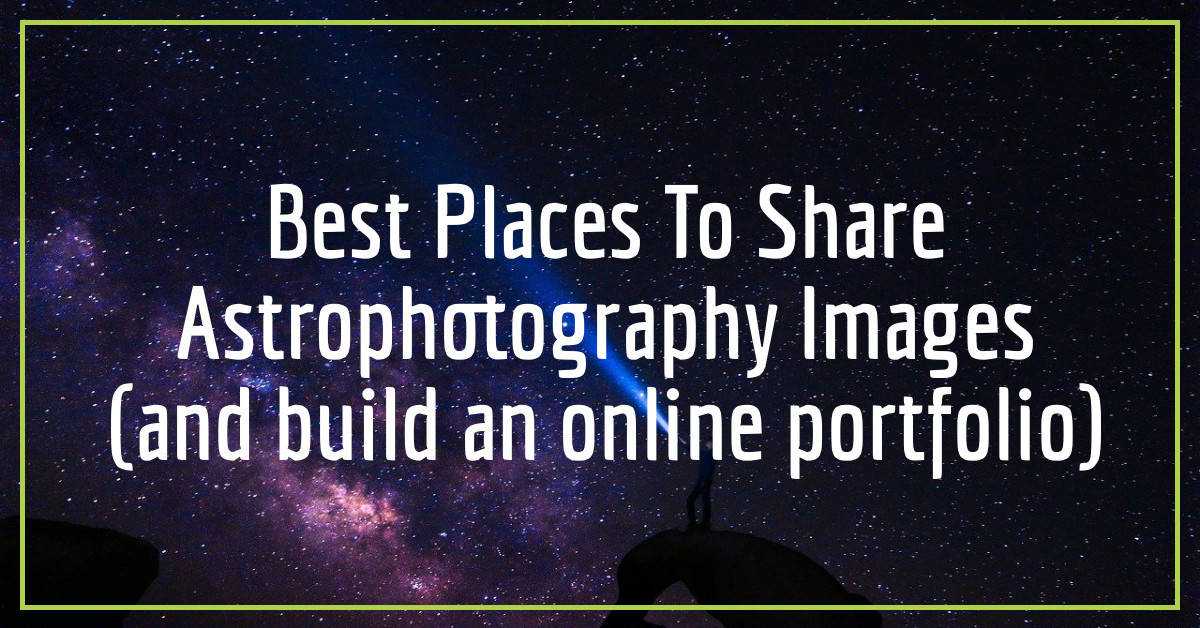If you’re into taking astrophotography images then you should definitely be sharing them online.
Even if you are a beginner and not confident in what you are doing, you will find that others will be supportive and give you tips on how you can improve.
It also forces you to really think about your images and how they can get better. From my personal experience, my photography skills improved exponentially when I started sharing my images online. It’s a great way of setting yourself goals like sharing a photo a day for a month or undertaking a 365 project.
Below we have listed a number of great websites where you can share your astronomy images online and outlined the pros and cons of each.
Photo Hosting and Online Portfolio Sites for Astrophotography
Image hosting and portfolio sites are platforms that are dedicated to showcasing photographers’ work and can offer opportunities such as:
- Getting feedback from other photographers,
- Creating well-presented portfolios, or
- Selling your images as prints.
Astrobin
Different from the others in this section, Astrobin is an image hosting platform specifically for astrophotography.
Users tend to come from the more advanced side and focus on deep sky objects. Having said that, beginners can certainly get involved on the site though and it’s a great way to learn from some really brilliant imagers.
Detailed information about equipment, acquisition and processing are shared with images. This also creates a cool feature in that you can easily find and sort images taken with specific telescopes, cameras, mounts, as well as seeing all images for specific objects etc.
It operates a subscription model for membership and being able to upload images, but there is a free entry-level option.
SmugMug
SmugMug is a paid-for photography portfolio site that allows you to store unlimited photos and easily create your own websites for displaying your images.
The bonus that appeals to many photographers is that it also allows you to sell your favorite images as prints and products.
Flickr
Flickr is a long-standing image hosting site and forum. It has actually been recently acquired by SmugMug, so expect to see greater collaboration/integration between the two in the future.
You can join groups and it provides the option to order prints of your images (for you only, not for sale to others like with SmugMug).
500px
500px is similar to Flickr but, in my opinion, a bit slicker and more fun to use.
You share your images and get a fairly quick reaction in terms of how well it has gone down through ‘likes’ and comments. People on there tend to be pretty supportive, but i’d say it’s more for popular photography and I wouldn’t expect too much in the way of insight from astrophotographers like you would with Astrobin.
You used to be able to sell images there but this feature has been removed in place of promoting photographers’ selling courses or presets for those that take up a paid membership.
Unsplash
Unsplash is a place where you can share images and effectively make them available as free stock images. People can download them and use on websites, in presentations, marketing materials or however they see fit.
There are some great photos and photographers on there. Some might not want to give away images for free for others to use, but it can be a good way to give yourself some exposure. Those who use the photos are under no obligation to give the photographer credit but many may choose to.
One neat trick is to share a photo on Unsplash and then when you see (in the stats) that it has been downloaded a number of times you can do a reverse image search on Google (effectively uploading your image in the google search bar) to find all the places where your photo has been used on the web. This could be just for your reference or you could drop the site owners a friendly email and ask if they’d credit you and/or link to your Instagram (or wherever you want to send people to find you).
Social Media Sites to Share Astrophotography Pictures
Social media sites and apps can be great ways of getting your photos out to wider audiences.
Instagram is the biggest photo-sharing app/website in the world.
It is primarily for mobile photography and so your images will be presented at a mobile-optimized resolution and size, and you can only upload images via a smartphone or tablet (although you can easily move any image you’ve taken with another camera onto your phone to do this).
If you want success (i.e. a lot of ‘likes’) you need to get into using hashtags and many copy and paste a hashtag cloud of doom each time featuring things like #space, #astrophotography, #astronomy, etc.
It’s a fun platform, rather than a way to get good feedback, but there are a lot of great astrophotographers on there – see our guide to the best astrophotographers to follow on Instagram.
I don’t think I need to introduce Facebook, but needless to say you can share your images here with family and friends.
Probably the best way to use it though is to join relevant groups and share there when looking for feedback. A couple of good groups are:
Twitter is a real-time social media site and is probably best used as a supporting partner to other places you are sharing your images.
I.e. create your SmugMug portfolio and then promote them by posting them on Twitter (with hashtags) and directing people to your portfolio.
It takes quite a bit of work to get a following on Twitter to make this worthwhile, but it can certainly be done and be a good place to connect with others who might support you. For example, if you use a Celestron telescope or Canon camera, you can tag Celestron or Canon and they may retweet your image.
Forums for Astrophotography Photos
Forums are another great place to share images and get feedback from peers.
If you don’t know, Reddit is a giant site that has forums (known as subreddits) for just about any topic you can think of.
You sign up (anonymously) to the site and then pick which subreddits to subscribe to and can join more as you use the site.
It’s actually a pretty good place for sharing astronomy images. You have to be a little thick-skinned to do so as there tend to be a handful of snarky comments thrown in with helpful ones each time.
Be particularly careful if you could be perceived as being overly self-promotional, i.e. just sharing links to your own images. You can combat this by providing additional content and value alongside your image, for example, a detailed description of how you took the photo that would be useful to others.
There are a number of subreddits that astrophotographers can find success on. Each has its own rules and so you should review these before posting anything and see what images and accompanying text others have used successfully:
Example of a successful Reddit post on the SpacePorn subreddit:
I took a 16k picture of the moon Monday night [OC] from r/spaceporn
Stargazers Lounge
Stargazers Lounge is an astronomy and astrophotography forum. It’s pretty old school in its presentation but brings together a community of observers and imagers and has about 65,000 members.
If you sign up as a member you can share images in the gallery section and create albums. It’s a good place to share with other enthusiasts, no matter your level, and get feedback on your acquisition and processing, etc.
Cloudy Nights
Similar to Stargazers Lounge, Cloudy Nights is an astronomy forum that is pretty old school in presentation but is a great way to learn and get feedback from some brilliant and experienced observers and imagers.
Other Platforms to Share Your Astronomy Images
If you are looking to really develop your own audience and share much more about your learnings then you could consider setting up a YouTube channel or your own blog.
Youtube
If you are successfully creating images, then producing videos to talk others through it can be an option. I’d probably only consider this once you are pretty experienced though so that you can really provide value with your teachings.
See our post on the best astrophotography channels to follow on YouTube for inspiration.
Blogging
An option is to create your own website with a platform like WordPress (which Skies & Scopes is built on), or use slightly simpler ones like Squarespace or Wix.
This might be a good option if you plan on writing a lot and perhaps developing a mailing list but if you are more focused on profiling your images, then building a portfolio with something like SmugMug probably makes more sense.
What do you think are good places to share astrophotography images?
A while ago, I set myself a challenge of sharing one image a day for a year (I only lasted three months, but whatever!). My photos improved quickly and dramatically from day one as I really started to consider and understand what makes a good image.
This happens by seeing the reception you get to different photos and by being able to examine how it looks from the outside in. i.e. by looking at whatever site you are sharing on as others would see the photos.
I chose to do this on 500px, I felt it was nice and simple to use and also I could do so anonymously while I improved my photography (and my confidence). I didn’t want to share these images on my Instagram account with friends and family, at least initially. You might feel different, but we can all choose our own way!
Either way, sharing your images online is an important step in developing as an astrophotographer and it’s good to have some options.
Please let me know in the comments below what you think of this list and if there are any other good places where you like to post your astronomy images.
If and when you are creating and sharing great astronomy images a further thing to consider is to enter them into astrophotography competitions.
Related articles:




Wonderful blog! I would also recommend “Solarchat” forum, probably the largest forum dedicated to solar photography.
That’s great, thanks!